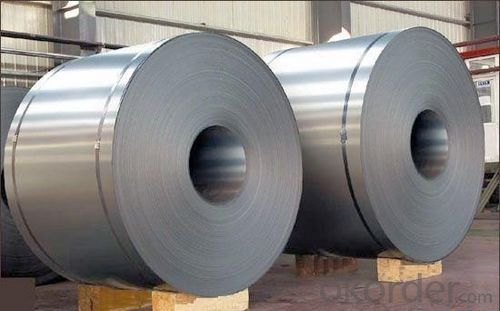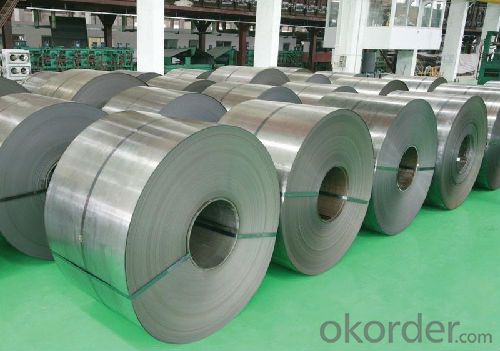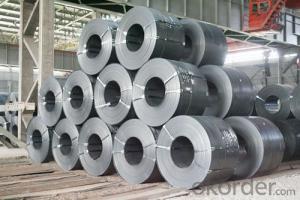Grade Q450NQR1 Corten Steel Coil 2.0*1000*C
- Loading Port:
- Shanghai
- Payment Terms:
- TT or LC
- Min Order Qty:
- 100 m.t
- Supply Capability:
- 20000 m.t/month
OKorder Service Pledge
OKorder Financial Service
You Might Also Like
Grade Q450NQR1 Corten Steel Coil 2.0*1000*C
Description:
-Grade: 09CuPCrNi-A
-Specification: 2.0*1000 in coil
Chemical Composition(%) of Grade Q450NQR1 Corten Steel Coil 2.0*1000*C:
| C | Si | Mn | P | S | Cu | Ti/V | Cr | Ni | RE |
| ≤0.12 | 0.25~0.75 | 0.20~0.50 | 0.060~0.12 | ≤0.020 | 0.25~0.50 | / | 0.30~1.25 | 0.12~0.65 | / |
Mechanical Properties of Grade Q450NQR1 Corten Steel Coil 2.0*1000*C:
| Thickness(mm) | Y.S(MPa) | T.S(MPa) | EL. A5% | Bend 180o | Impact Test | |
| oC | AKV J | |||||
| 2.0~≤6.0 | ≥345 | ≥480 | ≥24 | d=a | Normal/-40 | ≥47/≥21 |
| >6.0~12.0 | d=2a | |||||
Application of Grade Q450NQR1 Corten Steel Coil 2.0*1000*C:
Used in different weather. It has good anti rust protection and welding ability and is used in shipping container,support frame of outside building etc. Remarkably enhances the anti-corrosive performance of the structural element, lengthens the structural element service life, uses in manufacturing each kind of structural element which was used under the atmospheric envirenment and the caustic gas, the liquid envirenment.
Payment:
-Invoicing on theoretical weight or actual weight as customer’s request.
-FOB, CFR or CIF.
-Regular terms of payment:
1, 30% payment in advance, the remaining balance (70% payment) against the copy of B/L.
2, 30% payment in advance, the remaining balance (70% L/C) against the copy of B/L.
3, Negotiable.
-The payment terms will be written in contraction detailedly.
FAQ:
Q1: Why buy Materials & Equipment from OKorder.com?
A1: All products offered byOKorder.com are carefully selected from China's most reliable manufacturing enterprises. Through its ISO certifications, OKorder.com adheres to the highest standards and a commitment to supply chain safety and customer satisfaction.
Q2: How do we guarantee the quality of our products?
A2: We have established an advanced quality management system which conducts strict quality tests at every step, from raw materials to the final product. At the same time, we provide extensive follow-up service assurances as required.
Q3: How soon can we receive the product after purchase?
A3: Within three days of placing an order, we will arrange production. The shipping date is dependent upon the quatity, how many sizes you want and the plan of production, but is typically 1 month to 2 month days from the beginning of production.
Images of Grade Q450NQR1 Corten Steel Coil 2.0*1000*C:


*If you would like to get our price, please inform us the size, standard/material and quantity. Thank you very much for your attention.
- Q:How does special steel perform in high-speed machining operations?
- Special steel is specifically designed to perform well in high-speed machining operations. It has unique properties that make it ideal for cutting, drilling, and shaping at high speeds. Firstly, special steel has excellent thermal conductivity, which means it can effectively dissipate heat generated during the machining process. This is crucial in high-speed operations as excessive heat can cause tool wear and deformation. By efficiently transferring heat away from the cutting edge, special steel helps to prolong tool life and maintain dimensional accuracy. Secondly, special steel has high hardness and strength, which allows it to withstand the intense forces and pressures encountered during high-speed machining. This enables it to maintain its shape and integrity, reducing the chances of tool breakage or deformation. Moreover, its high strength also ensures that the machined parts have excellent durability and resistance to wear. In addition, special steel exhibits good machinability, meaning it can be easily cut and shaped with minimal effort. Its composition and microstructure are optimized for efficient chip formation and removal, ensuring smooth operations and reducing the risk of chip clogging or tool jamming. Furthermore, special steel often contains alloying elements such as chromium, molybdenum, and vanadium, which enhance its resistance to corrosion and wear. This is particularly important in high-speed machining operations, where the cutting tools and workpiece are in constant contact. The improved corrosion and wear resistance of special steel contribute to longer tool life and improved surface finish. Overall, special steel is specifically engineered to excel in high-speed machining operations. Its thermal conductivity, hardness, strength, machinability, and resistance to corrosion and wear make it a preferred choice for applications that require fast and precise metal removal.
- Q:What are the main corrosion resistance properties of special steel?
- The main corrosion resistance properties of special steel include high resistance to rust, oxidation, and corrosion in various environments, such as acidic, alkaline, and marine conditions. Special steel is often alloyed with elements like chromium, nickel, and molybdenum, which form a protective layer on the surface and enhance its resistance to corrosion. Additionally, special steel may have a low carbon content, reducing the likelihood of corrosion caused by carbide precipitation. These properties make special steel a reliable choice for applications where resistance to corrosion is crucial, such as in the construction, automotive, and aerospace industries.
- Q:What are the different types of welding techniques used for special steel?
- There are several types of welding techniques used for special steel, including TIG (Tungsten Inert Gas) welding, MIG (Metal Inert Gas) welding, Stick welding, and Flux-cored arc welding. These techniques are commonly used for welding special steel due to their ability to provide strong and precise welds, ensuring the integrity and durability of the material.
- Q:How does special steel contribute to reducing product downtime?
- Special steel contributes to reducing product downtime by offering enhanced mechanical properties such as increased strength, hardness, and wear resistance. This allows components made from special steel to withstand harsh operating conditions, reducing the likelihood of breakdowns or failures. Additionally, special steel can be tailored to specific applications, ensuring optimal performance and longevity. By using special steel in the manufacturing process, products are more reliable, have longer service lives, and require less frequent maintenance, leading to reduced downtime and improved productivity.
- Q:How does special steel contribute to the energy generation industry?
- Special steel contributes to the energy generation industry by providing high-strength, corrosion-resistant, and heat-resistant materials that are crucial for the construction and maintenance of power plants, turbines, and other energy infrastructure. This ensures the reliability, efficiency, and longevity of these structures, enabling them to withstand extreme conditions and maximize energy production.
- Q:Can special steel be used in the manufacturing of precision instruments?
- Yes, special steel can be used in the manufacturing of precision instruments. Special steel refers to a category of steel that has been specifically designed and processed to possess certain properties, such as high strength, hardness, corrosion resistance, and thermal stability. These properties make special steel ideal for applications where precision and accuracy are crucial, such as in the manufacturing of precision instruments. Precision instruments, such as surgical tools, measuring devices, optical instruments, and scientific equipment, require materials that can maintain dimensional stability and withstand extreme conditions. Special steels, such as stainless steel, tool steel, and high-speed steel, offer excellent mechanical properties, including high tensile strength, wear resistance, and dimensional stability. This makes them well-suited for precision instrument manufacturing. Furthermore, special steel can be engineered to have specific characteristics, such as low magnetic permeability or excellent resistance to temperature changes. These properties are particularly important in precision instruments where magnetic interference or temperature variations can affect their performance. In conclusion, special steel can indeed be used in the manufacturing of precision instruments due to its exceptional mechanical properties, dimensional stability, and ability to withstand extreme conditions. Its versatility allows for the production of high-quality precision instruments that meet the stringent requirements of various industries, including medical, scientific, and engineering fields.
- Q:What are the different methods for joining special steel?
- Special steel, commonly used in applications requiring high strength, corrosion resistance, or specific mechanical properties, can be joined using various methods. Some of the most frequently employed methods include: 1. Welding: The most commonly used technique for joining special steel is welding. Different welding methods can be utilized, such as arc welding (including shielded metal arc welding, gas metal arc welding, and flux-cored arc welding), resistance welding (spot welding, seam welding), and laser welding. Welding necessitates the use of filler material to bond the steel components together, resulting in strong and durable joints. 2. Brazing: The process of joining special steel through brazing involves the use of a filler material (typically a brass or bronze alloy) with a lower melting point than the base steel. The filler material is heated until it melts and flows into the joint, creating a robust bond. Brazing is commonly employed for joining dissimilar metals or when the base steel possesses a high melting point. 3. Soldering: Similar to brazing, soldering involves the use of a filler material with a lower melting point to join special steel. However, soldering usually employs a non-ferrous filler material, such as tin-lead or tin-silver alloys. Soldering is frequently utilized for joining electronic components or fragile parts that cannot endure high temperatures. 4. Mechanical Fastening: Special steel can also be joined using mechanical fasteners, including bolts, screws, rivets, or clips. This method is often chosen when the joint needs to be easily disassembled or when welding or brazing is impractical or undesirable. 5. Adhesive Bonding: Adhesive bonding involves the use of specialized adhesive or glue to join special steel. This method is suitable when joining thin or delicate steel components or when the joint requires high resistance to vibration or shock. Adhesive bonding can create a strong and durable bond, although it may not be suitable for high-temperature or high-stress applications. When selecting the appropriate method for joining special steel, it is crucial to consider the specific requirements of the application, such as strength, corrosion resistance, temperature resistance, and desired permanence of the joint. Each method possesses its own advantages and limitations, and choosing the right approach ensures a robust and dependable joint.
- Q:How does special steel comply with international standards?
- Special steel is a type of steel that is specifically designed and manufactured to possess exceptional properties and performance characteristics. When it comes to complying with international standards, special steel undergoes a rigorous process to ensure its quality and adherence to the established norms. Firstly, special steel production adheres to international standards through the selection of raw materials. The composition and quality of the raw materials used in the manufacturing process are carefully controlled and tested to meet the specifications outlined by international standards organizations. This ensures that the special steel produced is of the desired quality and possesses the required mechanical properties. Secondly, special steel manufacturers follow standardized production processes. These processes are designed in accordance with international guidelines and standards to guarantee consistency and traceability. Through the use of advanced technologies and quality control measures, special steel manufacturers can monitor and control every stage of production, from melting and casting to rolling and heat treatment. This ensures that the final product meets the required standards in terms of chemical composition, mechanical properties, and dimensional tolerances. Furthermore, special steel undergoes stringent testing and inspection procedures to validate its compliance with international standards. This includes various destructive and non-destructive testing methods such as ultrasonic testing, hardness testing, and microstructure analysis. These tests are conducted by certified laboratories and independent third-party agencies to ensure unbiased and accurate results. In addition, special steel manufacturers often have their production processes and quality management systems audited and certified by recognized bodies, such as ISO (International Organization for Standardization), to demonstrate their commitment to compliance with international standards. It is also worth mentioning that special steel manufacturers actively participate in international standardization committees, such as ASTM International and the International Organization for Standardization (ISO). By engaging in these committees, they can contribute to the development and revision of international standards, ensuring that their products remain up to date and in line with the latest industry requirements. In conclusion, special steel complies with international standards through careful selection of raw materials, adherence to standardized production processes, rigorous testing and inspection procedures, and active participation in international standardization committees. By following these measures, special steel manufacturers demonstrate their commitment to producing high-quality products that meet the stringent requirements of international standards.
- Q:What are the challenges in manufacturing special steel?
- There are several challenges in manufacturing special steel. One of the main challenges is ensuring the precise composition and properties of the steel. Special steels often require specific alloying elements and precise heat treatments to achieve desired characteristics, making it crucial to maintain strict quality control throughout the manufacturing process. Another challenge is the high cost of raw materials and the need for advanced equipment and technology to produce special steel. Additionally, meeting stringent industry standards and regulations, as well as managing environmental impacts, can pose challenges in the manufacturing of special steel.
- Q:Can special steel be used for making power generation equipment?
- Yes, special steel can be used for making power generation equipment. Special steels are specifically designed to have enhanced properties such as high strength, corrosion resistance, heat resistance, and wear resistance. These properties make special steel suitable for use in demanding applications such as power generation equipment, which often operates under high temperatures and pressures. Power generation equipment, such as turbines, boilers, and generators, require materials that can withstand harsh operating conditions and deliver reliable performance over an extended period. Special steel grades, such as stainless steels, nickel-based alloys, and heat-resistant steels, are commonly used in the construction of power plants and power generation equipment. Stainless steels are frequently used in power generation due to their excellent corrosion resistance, which is crucial for equipment exposed to high moisture or aggressive environments. Nickel-based alloys are renowned for their exceptional high-temperature strength, making them ideal for components subjected to extreme heat, such as turbine blades or exhaust systems. Heat-resistant steels, on the other hand, are specifically designed to retain their mechanical properties at elevated temperatures, making them suitable for applications such as boilers and heat exchangers. In summary, special steel offers a range of desirable properties that make it highly suitable for manufacturing power generation equipment. Its strength, corrosion resistance, heat resistance, and wear resistance make it an excellent choice for withstanding the demanding conditions found in power plants and ensuring the reliable and efficient generation of electricity.
1. Manufacturer Overview |
|
|---|---|
| Location | |
| Year Established | |
| Annual Output Value | |
| Main Markets | |
| Company Certifications | |
2. Manufacturer Certificates |
|
|---|---|
| a) Certification Name | |
| Range | |
| Reference | |
| Validity Period | |
3. Manufacturer Capability |
|
|---|---|
| a)Trade Capacity | |
| Nearest Port | |
| Export Percentage | |
| No.of Employees in Trade Department | |
| Language Spoken: | |
| b)Factory Information | |
| Factory Size: | |
| No. of Production Lines | |
| Contract Manufacturing | |
| Product Price Range | |
Send your message to us
Grade Q450NQR1 Corten Steel Coil 2.0*1000*C
- Loading Port:
- Shanghai
- Payment Terms:
- TT or LC
- Min Order Qty:
- 100 m.t
- Supply Capability:
- 20000 m.t/month
OKorder Service Pledge
OKorder Financial Service
Similar products
New products
Hot products
Related keywords






























